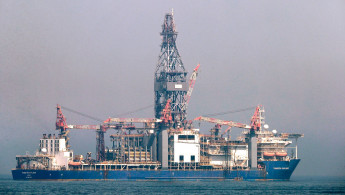Israel accuses Lebanon of changing stance on maritime border
Israel has accused Lebanon of changing its position in talks on their disputed maritime border and warned it could lead to a "dead end" that would be damaging for the whole region.
The two countries, which remain technically at war, opened negotiations on the border dispute under US and UN auspices last month to clear the way for offshore oil and gas exploration.
"Lebanon has changed its stance on its maritime border with Israel seven times," Israeli Energy Minister Yuval Steinitz tweeted late Thursday.
"Its current position contradicts not only its previous one, but also Lebanon's stance on its maritime border with Syria, which takes into account Lebanese islands close to the border."
Earlier on Thursday, Lebanese President Michel Aoun had set out his country's views on where its maritime border lies, which he said should be "based on the line that departs on land from the point of Ras Naqoura".
The demarcation should be "according to the general principle known as the median line, without taking into account any impact of the occupied Palestinian coastal islands", Aoun tweeted, referring to the Israeli coastline.
Israel and Lebanon have been negotiating based on a map registered with the United Nations in 2011, which shows an 860-square-kilometre (330-square-mile) patch of sea as being disputed.
But Lebanon considers that map to have been based on wrong estimates.
Aoun's tweet confirms that Lebanon is now demanding an additional 1,430 square kilometres (552 square miles) of sea to the south, which includes part of Israel's Karish gas field, said Lebanese energy expert Laury Haytayan.
The US-led talks have been in the works for three years, and will likely resume in December.
In February 2018, Lebanon signed its first contract for off-shore drilling for oil and gas in Block 9 and Block 4 with a consortium comprising energy giants Total, ENI and Novatek.
Lebanon in April said initial drilling in Block 4 had shown traces of gas but no commercially viable reserves.
Exploration has not started in Block 9, part of which lies in the disputed area.
Lebanon's desperation to find commercial gas reserves has grown since the country plummeted in worst economic crisis since its 1975-1990 civil war, after widespread protests and the outbreak of the coronavirus has rendered it desperate for new sources of income.
Twitter Post
|





 Follow the Middle East's top stories in English at The New Arab on Google News
Follow the Middle East's top stories in English at The New Arab on Google News
![Israeli forces ordered bombed Gaza's Jabalia, ordering residents to leave [Getty]](/sites/default/files/styles/image_330x185/public/2176418030.jpeg?h=a5f2f23a&itok=_YGZaP1z)

